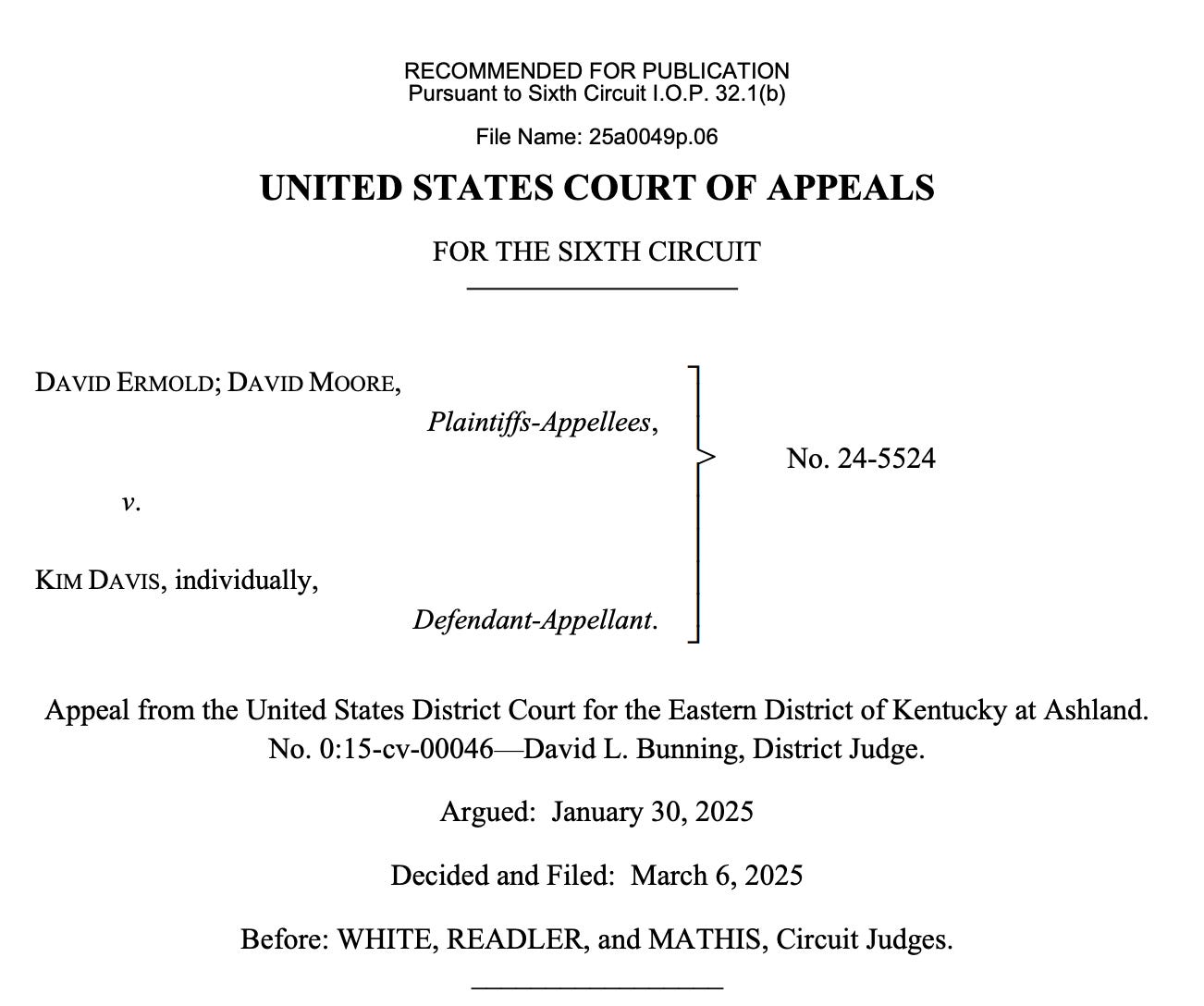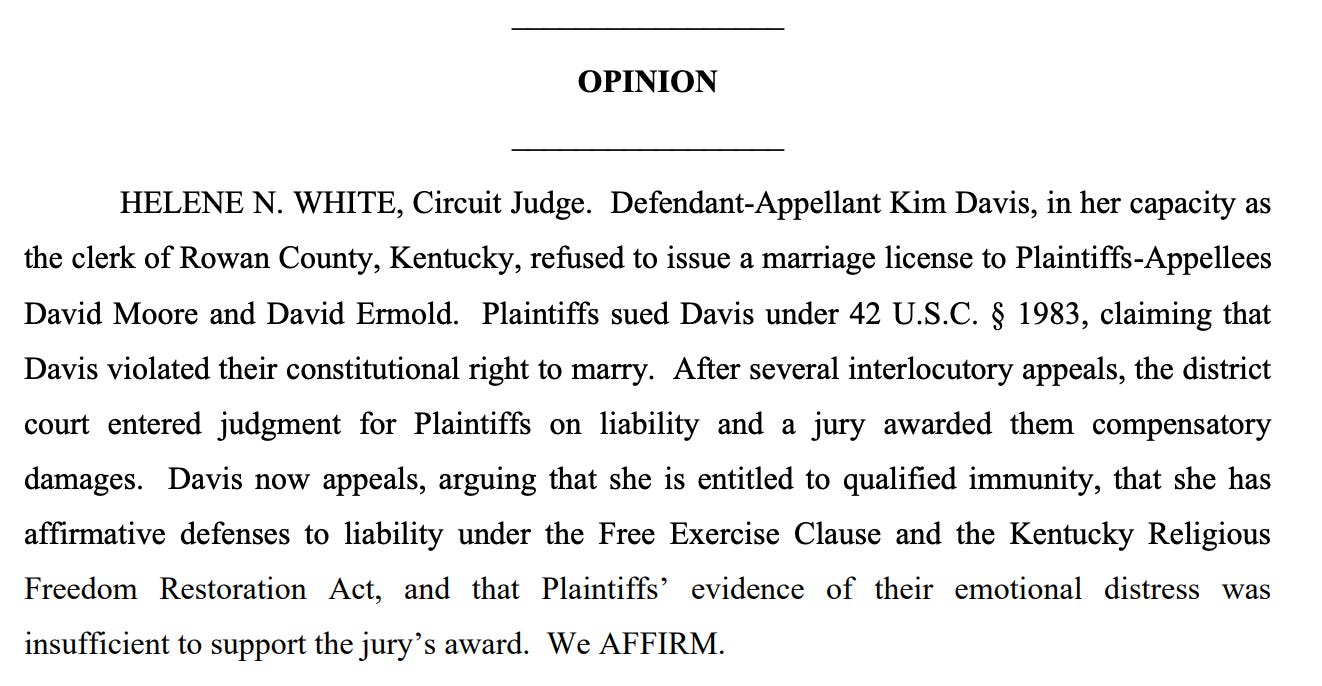Kim Davis loses. Again. Unanimously. (But, this still might not be the end.)
The Sixth Circuit rejected the appeal of the former Kentucky county clerk who was sued after she refused to issue marriage licenses to same-sex couples.
Kim Davis, the Kentucky clerk who refused to issue same-sex couples marriage licenses, lost her appeal on Thursday of a lawsuit she previously lost at trial that was brought by same-sex couples whose constitutional right to marry she violated.
All three judges on the panel of the U.S. Court of Appeals for the Sixth Circuit — which included one Trump appointee — agreed that Davis should lose her appeal.
Judge Helene White wrote the court's opinion in the unending case, upholding the liability determination against Davis and damages awarded below.
White, a George W. Bush appointee who had originally been nominated to the court by then-President Clinton, dispatched Davis’s arguments rather quickly, starting by holding that Davis’s argument that she was entitled to qualified immunity had, in effect, already been decided.
“This court has rejected that argument twice,“ White wrote, holding that the “law-of-the-case doctrine” — which is exactly what it sounds like it is — applied here. “Only in ‘exceptional circumstances’ will this court reconsider a legal issue decided by a prior panel in the same case,” she wrote, holding that no such circumstances were present here.
In a footnote, White added, “Even if we were not bound by the law of the case and could properly entertain Davis’s assertion of qualified immunity, Davis’s argument is weak.”
In the absence of that, Davis’s remaining arguments were that the Free Exercise Clause of the First Amendment or Kentucky’s Religious Freedom Restoration Act should be available to her as a “defense to liability.”
Summing up the arguments, White wrote, “As Davis sees it, issuing Plaintiffs a marriage license would have violated her own constitutionally protected religious beliefs; thus, she asserts, she cannot be held liable.”
As to those arguments, White continued, “We disagree.”
On the First Amendment argument, White wrote, “The First Amendment shields Davis where she ‘functioned as a private citizen,’ but not where she ‘engaged in state action.’” In other words, she can’t use the free exercise clause to excuse her from liability for refusing to follow the law in her former role as a government official taking — or refusing to take — government action.
As White put it:
Davis’s contrary view would subvert the Bill of Rights. As Davis sees it, a public official can wield the authority of the state to violate the constitutional rights of citizens if the official believes she is “follow[ing] her conscience.” Appellant’s Brief at 26. That cannot be correct. “The very purpose of a Bill of Rights” is to place certain freedoms “beyond the reach of . . . [government] officials.” W. Va. State Bd. of Ed. v. Barnette, 319 U.S. 624, 638 (1943).
As to the Kentucky RFRA claim, White concluded that “that statute does not apply here.”
Judge Andre Mathis, a Biden appointee, joined White’s decision.
Judge Chad Readler, a Trump appointee, was the final judge on the panel. Although he agreed with part of White's ruling and agreed with the court's decision affirming the decisions below, he wrote separately to raise three points.
One of those points was somewhat concerning in the context of Davis’s case. (The other two were slightly differing reasons from White for rejecting Davis’s First Amendment and Kentucky RFRA arguments.)
Readler’s opening is two paragraphs about how Obergefell v. Hodges, the Supreme Court's 2015 marriage equality decision, was "far from unanimous." Although that is obviously true, as a factual matter, to what end is it raised here?
Well, Readler then quoted from the dissents of that opinion before writing that, "right or wrong," Obergefell is “the law of the land” and the appeals court "must follow" it.
“That includes Kim Davis, in her role as Rowan County Clerk,” Readler wrote. “Accordingly, I agree that we should affirm the judgment against Davis.“
In other words, a federal appeals court judge needed a paragraph of throat-clearing about the “deeply divided“ nature of a case decided a decade ago before concluding that because the decision, “right or wrong,” is the “law of the land,” he is “[a]ccordingly” joining the court’s decision.
This is particularly concerning in light of the case before Readler — and in light of the arguments made in that case. As reported last year at Law Dork, Davis and her Liberty Counsel and other lawyers argued in their briefing before the Sixth Circuit that Obergefell should be overturned. Davis raised it at the Sixth Circuit, her lawyers wrote, despite the fact that it was the law of the land because she wanted to "to preserve" the argument for a potential Supreme Court appeal.
In other words, even Davis’s lawyers didn’t think they could win on that issue at the Sixth Circuit. But, Davis and her lawyers could now seek Supreme Court review.1
In seeking such review, Davis’s lawyers could raise the question of overturning Obergefell directly to the justices — the argument that Davis’s lawyers said she preserved before the Sixth Circuit.
For what it’s worth, however, White wrote in a footnote that Davis hadn’t actually preserved the argument because the Sixth Circuit was the first time she raised it.2
Although — even if it was preserved — I still don’t think the Supreme Court would be eager to take up such a question, a position I’ve long expressed, I would add two cautionary notes.
First, it only takes four votes to grant certiorari, and we can be close to certain that Justices Clarence Thomas and Sam Alito would vote for cert on that question in the right case — meaning they would just need two other justices to vote for cert to, at the least, force the issue to full merits review, with all of the consequences and instability of that even if Obergefell is ultimately upheld. (However, it’s entirely possible that even Thomas and Alito might decide this case is too messy a “vehicle” for the issue — especially if Davis’s lawyers don’t have a good response to White’s statement about the issue not being preserved — and wait for another case to try to get the four votes for cert.)
Second, it’s obviously an unprecedented moment, and I never want to count something out entirely when — even if unlikely — the effects would be extraordinary.
But, for now, Davis lost, again, and unanimously from a panel of Sixth Circuit.
[Correction: This post was updated shortly after publication to clarify information about Judge Helene White’s judicial nomination, with the final update at 4:50 p.m.]
Davis also could seek en banc review by the full Sixth Circuit, but Readler’s decision to concur in the judgment here makes me think that route is far less likely than I otherwise might have thought in light of the current 9 Republican appointees-7 Democratic appointees split of the appeals court. Additionally, because White is senior status, she would be allowed to participate in en banc consideration if granted, along with the 16 active status judges, making the math for reversal even more difficult.
This paragraph, the image below it, and the “vehicle” parenthetical were added after initial publication, with the final update at 2:50 a.m. March 7.





![3Davis also argues that Obergefell should be overturned. She acknowledges that this court cannot overturn Obergefell, but she asserts she is raising the issue to preserve it for Supreme Court review. Ironically, however, it appears that Davis did not preserve this issue because she never raised it below. She did not argue that Obergefell should be overturned in her motion to dismiss, her motion for summary judgment, or her motion for judgment as a matter of law. Indeed, in moving to dismiss, Davis expressly stated that she did not “want[] to relitigate the Supreme Court’s decision in Obergefell.” R. 29-1, PID 147. 3Davis also argues that Obergefell should be overturned. She acknowledges that this court cannot overturn Obergefell, but she asserts she is raising the issue to preserve it for Supreme Court review. Ironically, however, it appears that Davis did not preserve this issue because she never raised it below. She did not argue that Obergefell should be overturned in her motion to dismiss, her motion for summary judgment, or her motion for judgment as a matter of law. Indeed, in moving to dismiss, Davis expressly stated that she did not “want[] to relitigate the Supreme Court’s decision in Obergefell.” R. 29-1, PID 147.](https://substackcdn.com/image/fetch/$s_!X1tB!,w_1456,c_limit,f_auto,q_auto:good,fl_progressive:steep/https%3A%2F%2Fsubstack-post-media.s3.amazonaws.com%2Fpublic%2Fimages%2F0a62539b-3519-4b82-a9fc-53bce3a6d407_1328x270.png)
Davis is far from a vexatious litigant in the technical sense, but it's ridiculous to me that this case continues, and I'm convinced that it does in large part bc of two factors:
1) She isn't paying for any of this. The right wing has made her a martyr and fully funded her case no matter how many billable hours it racks up. Moreover, when it finally ends, I am personally convinced (without having looked at any particular financial facts) that her cries of martyrdom will be enough to ensure that anything she is forced to disburse won't come from her own pockets, but from fascist donors who hate queers and thank her for her attacks on a hated minority.
2) Like many if not all of her donors, she feels positively about the pain she causes in prolonging the suit. She wants to continue the suit bc she wants to stab queers in the heart again and again and again. The cruelty is the point of her appeal.
If there are other factors -- one might be honest hope that her suit would be used to overturn Obergefel, even though it seems the wrong legal vehicle to do so -- they count for little when compared to these first two.
At least in my NSH opinion.
Kim: Goldarned gays—back in the closet with you! I gonna hold my breath until all a youse get back in there!